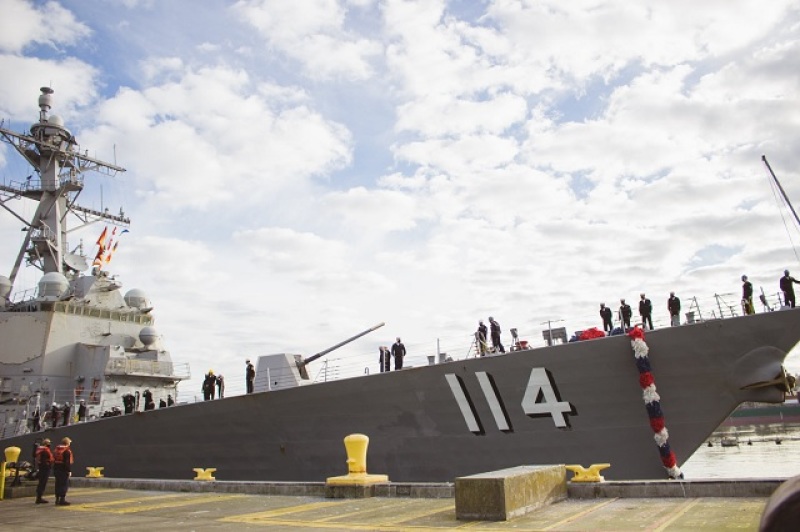
The USS Ralph Johnson on Saturday entered the Taiwan Strait for the second time in 2022 and amid Russia-Ukraine tensions, causing China to flinch at what they called a "provocative" move. However, the .U.S Navy Destroyer's thru-route was described as "routine" by 7th Fleet spokesman Lt. Nicholas Lingo.
According to Reuters, the U.S. Navy Destroyer was merely conducting a "routine" transit through international waters that have long been contested by China and Taiwan. Lt. Lingo said, "The ship's transit through the Taiwan Strait demonstrates the United States' commitment to a free and open Indo-Pacific. The United States military flies, sails, and operates anywhere international law allows."
But China was unhappy with the U.S. Navy Destroyer's passage through the Taiwan Strait. The Eastern Theatre Command of China's People's Liberation Army, which monitored the passage, called it a "provocative act" by the U.S., a spokesperson said.
Taiwan's Defense Ministry, however, said that the Arleigh Burke-class guided-missile destroyer moved in a northerly direction through the Taiwan Strait and that they had "monitored its passage and observed nothing out of the ordinary."
U.S. navy ships sail through the Taiwan Strait regularly, doing so once every month. But Saturday's trip was the first since November, Fox News reported. Taiwan remains on heightened alert amid Russia-Ukraine tensions. On Saturday, Taiwan's Defense Ministry said that up to eight Chinese aircraft, including six fighters and two anti-submarine aircraft flew into its air defense identification zone or ADIZ, to the northeast of the Taiwan-controlled Pratas Islands that lie on the northern part of the South China Sea.
China has long routinely condemned the U.S. for its exercises in the South China Sea. On Thursday, Chinese Defense Ministry spokesman Tan Kefei underscored again that Taiwan was a "core issue" of China's and that the regime will not allow interference from foreign forces, Nikkei Asia reported.
Tan warned, "We urge the U.S. side to recognize the high sensitivity of the Taiwan issue, stop interfering in China's internal affairs and stop playing with fire on the Taiwan issue."
However, analysts and China watchers believe that a Chinese attack on Taiwan is unlikely amid Russia-Ukraine tensions, The Guardian reported. Experts believe that this year is a "politically sensitive" one for President Xi Jinping, who now faces a "once-in-five-years leadership congress."
Moreover, Taiwan is believed to be "more easily defended" than Ukraine and is "more important strategically and economically" to other world powers such as the United States.
Brookings Institute scholar on China and Asia, Ryan Hass explained that China has emphasized that time is on their side for "cross strait [unification]" and that "trends are favoring China." He called this an "alibi for maintaining the status quo throughout a turbulent year."
In Taiwan itself, people have mixed feelings about an imminent attack from China, from which the threat of invasion has long hung over their heads. Amid Russia-Ukraine tensions, Taiwan is watching closely as to how allies are responding to Ukraine, as they may find themselves in a similar situation in the near future.
"If the US is perceived as indecisive or incoherent or otherwise indifferent to western Europe's concern about Russia, then that may diminish western Europe's intention and willingness to help the US in the Indo-Pacific theater as well," political scientist Wen-ti Sung of the Australian National University remarked.


















